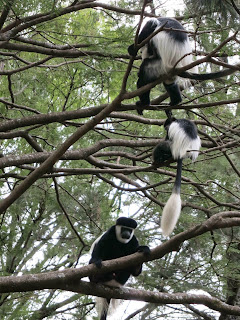I will be working on a major joint project between the Southern Nations, Nationalities,
and Peoples’ Regional Education Bureau (SNNP REB) and
the British Council beginning as soon as the budget for the teacher training portion
of the project can be secured. In the meantime, I am working on collecting
baseline data for an Impact Assessment Project that will hopefully provide
detailed and useful information for the SNNP REB, the British Council and CUSO-VSO (the organizations that are sponsoring me to be here) regarding the English
Language Improvement Initiative that has been launched by the SNNP REB and the
British Council.

Photo: Meeting with English teachers and administration to discuss ELIC program
I am travelling to some remote areas because many of the schools are in remote villages and for reasons I am still sorting out, a lot of the data needs to be collected in person. When we are at the
remote schools, I feel a bit like a tourist attraction. At one school I was
swarmed by literally hundreds of school kids all of whom wanted to practice
their English with me. It was like
pushing through a dense jungle except the trees were people with outstretched
limbs trying to make contact. We have had many adventures while on the road
from the truck getting 2 flat tires when we only had one spare and being stuck in a remote village for hours waiting for help to having to use 4x4 to get
through washed out areas of dirt roads. However, the result of going to remote
areas is the chance to see some amazing countryside and meet some of the most
generous people I have ever come across.
Photo: Flat tire number one, everyone jumps in to help.
Photo: One of the more rural areas we passed through.

Photo: More of the rural landscape
Photo: Grass roofed house - completely waterproof


















